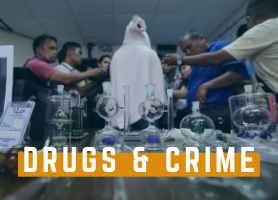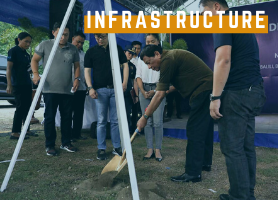Expressing disappointment over his failure to deliver on a campaign promise to end the drug menace, President Rodrigo Duterte repeated in his 2019 SONA his request to Congress to pass a bill restoring the death penalty on drug-related crimes and plunder.
“It has been three years since I took my oath of office, and it pains me to say that we have not learned our lesson. The illegal drug problem persists,” he said before the joint session of the Senate and the House of Representatives.
Taking their cue, his allies quickly responded by filing bills imposing the capital punishment, but strong opposition, primarily coming from the religious sector and human rights groups, has been stalling its legislation.
The death penalty was abolished by Republic Act No. 9346, signed into law by then-president Gloria Macapagal-Arroyo in 2006.
While campaigning for the presidency in 2016, Duterte wooed voters with a promise to end the drug problem in the country within “three to six months.” He warned that the Philippines would turn into a narco-state if nothing is done against illegal drugs. Two years after he was elected, he admitted that “drugs will not end at the end of my term” and that it could even “worsen.”
The government’s war on drugs, dubbed as Project Double Barrel, has been marred by controversy primarily due to the death of at least 5,700 drug suspects during anti-drug operations, and to some 20,000 vigilante-style killings estimated by several human rights groups.
Due to the number of killings, the government’s anti-drug war became a serious concern for advocates of human rights here and abroad. It also generated interest from international news organizations.
In 2017, petitions were filed in the Supreme Court (SC) to halt the implementation of the government’s war on drugs, challenge its constitutionality, and ask for protection from the High Court through the Writ of Amparo.
After a unanimous decision, the SC ordered the Philippine National Police (PNP) and Office of the Solicitor General (OSG) to release thousands of documents related to the anti-narcotics campaign. The PNP and OSG submitted the requested reports to the SC and furnished copies to the petitioners.
Yet, the Center for International Law, which represents families of the victims in San Andres Bukid, Manila, said what had been turned over were all “rubbish” and asked the SC to charge PNP and OSG for “contempt of court.”
Last June 4, UN High Commissioner for Human Rights Michelle Bachelet released a report that details “widespread human rights violations and persistent impunity” in the Philippines. This was one year after the United Nations Human Rights Council (UNHRC) — an international organization for human rights of which the Philippines is a member — adopted a resolution led by Iceland to investigate the human rights situation, including extra-judicial killings, under Duterte’s drug war.
The 26-page report of the High Commissioner during the 44th session of the UNHRC in Geneva on June 30 cited the need for an “independent, impartial and effective” investigation on the alleged systematic killings. It also asked to scrap “Oplan Tokhang,” one of the two strategies under Double Barrel done by the police through house-to-house visits to persuade drug personalities to surrender and stop illicit activities.
In the same forum, Justice Secretary Menardo Guevarra responded with an announcement of the creation of a review panel led by his office. But international independent group Human Rights Watch questioned the “credibility” of the panel composed of offices “directly implicated” in the government’s bloody drug war. (See HR groups question credibility of PH review panel for ‘war on drug’ killings)
In January, Vice President Maria Leonor “Leni” Robredo came up with a 40-page report criticizing the government’s lack of “reliable” data on its campaign against illegal drugs. Robredo released her detailed findings and recommendations after her 19-day stint as co-chair of the Inter-Agency Committee on Illegal Drugs (ICAD).
Amid the on-going coronavirus disease (COVID-19) pandemic in the first half of 2020, Duterte, in a late night press briefing in April, instructed both police and military to “shoot dead” unruly quarantine violators.
The president has not succeeded yet in getting a death penalty bill passed by Congress. Instead, he got an anti-terrorism bill that he had signed into law which authorizes warrantless arrests and detention without charges for up to 24 days. (See VERA FILES FACT SHEET: What you need to know about the Senate’s anti-terrorism bill)
See how the Duterte government fared on the following promises:
PROMISE: Reimposition of death penalty for heinous crimes related to drugs and plunder
|
|
“I respectfully request Congress to reinstate the death penalty for heinous crimes related to drugs, as well as plunder.” (SONA 2019) “I therefore ask Congress to act on all pending legislations to reimpose the death penalty on heinous crimes — especially on the trafficking of illegal drugs.” (SONA 2017)
|
|
At least 11 bills were filed in the Senate and 13 bills in the House of Representatives since the 2019 SONA. The Senate started debating in August on bills seeking to reimpose capital punishment for crimes involving dangerous drugs, among others. Sen. Richard Gordon, chair of the Justice and Human Rights Committee in-charge of the hearings and chairman of pro-life Philippine Red Cross, opposed the measure. He said he does not believe in its efficacy in deterring crime and drug use in the country. The House committees on Justice and on Dangerous Drugs began tackling the bills in September. Talks on the revival of the death penalty also surfaced amid the fiasco over the implementation of the Good Conduct Time Allowance (GCTA) involving the transfer of 10 “high profile” convicts from New Bilibid Prison in Muntinlupa City to the Philippine Marines Barracks in Taguig City, citing threats to security. Seven of these inmates were witnesses in the alleged involvement in illegal drug trade of Sen. Leila de Lima. (See VERA FILES FACT SHEET: Transfer of Bilibid inmates: 3 things you should know & VERA FILES FACT SHEET: Five things you should know about presidential pardons ). One of them, Jaybee Sebastian, reportedly died inside the jail due to COVID-19 on July 18. The GCTA hearing also branched out to issues on alleged recycling of drug evidence by police or “ninja cops” and a “freedom for sale” scheme involving release from jail of prisoners in exchange for bribe money among others. |
PROMISE: Revival of mandatory ROTC
|
|
“We expect support for legislative initiatives aimed at strengthening defense-related systems such as the proposed…revival of the mandatory ROTC in Grades 11 and 12.” (SONA 2019) “Let us also strengthen our ROTC Program to instill love of country and good citizenship.” (SONA 2016) |
|
Duterte renewed his appeal to the Congress to pass the mandatory Reserve Officers Training Corps (ROTC) in December 2019 during his speech at the closing ceremony of the National ROTC Summit. Over 32 ROTC bills are pending in the House committees on Basic Education and Culture and on Higher and Technical Education. The bills aim to train students with skills for “national defense preparedness,” or as military reservists in both public and private institutions. Seventeen of the pending bills focus on implementing the training for Senior High school students (Grade 11 to 12), while nine were for college students. Six other bills were filed, requiring college-level and senior high school students to undergo Citizen Service Training Course on “security, territorial, peace and order, and disaster risk reduction and management.” However, Kabataan Partylist Rep. Sarah Elago filed a counter resolution, asking Duterte to “not make ROTC mandatory” because it “continues to be a hotbed of abuse and corruption.” The House Committees on Basic Education and Culture, and on Higher and Technical Education formed on Feb. 11 a technical working group to consolidate all ROTC bills. Nine ROTC bills are pending in the Senate. Sen. Sherwin “Win” Gatchalian, in a joint Senate hearing on Aug. 22 last year, said the implementation of ROTC, if it becomes law, will require a budget of P38 billion a year, or P2 billion less than the budget for Free Higher Education Act. |
PROMISE: Fight against illegal drugs will be relentless and chilling
|
|
“The war against illegal drugs is far from over. Where before, the war resulted in the seizure of illegal drugs worth millions of pesos, today, they run [into] billions in peso value…This is why the illegal drugs war will not be sidelined. Instead, it will be as relentless and chilling, if you will, as on the day it began.” (SONA 2018) |
|
Newly appointed chief of Philippine Drug Enforcement Agency (PDEA) Wilkins Villanueva announced on July 15 the creation of a working group to monitor the implementation of Barangay Drug Clearing Program nationwide. According to PDEA’s Real Numbers data released a day prior, from July 2016 to May 2020, there are 18,582 cleared barangays and 15,388 barangays yet to be cleared. The crime rate nationwide dropped by 56 percent, according to Philippine National Police (PNP) Chief Archie Gamboa while the Enhanced Community Quarantine was in place to contain the COVID-19. |
PROMISE:Addressing prosecution backlog, especially in illegal drugs cases
|
|
To address backlogs and low prosecutorial effectiveness and efficiency, the investigation and case management processes shall be streamlined including those for illegal drugs and heinous crimes. (SONA 2016) |
|
Only one bill by Senate president Vicente “Tito” Sotto III has so far been filed in the Senate, while four are pending in the House committee since July 2019. The bills aim to create a separate dangerous drugs court to “expedite cases, according to Article XI of Dangerous Drugs Act of 2002.” In the judiciary, the Supreme Court on July 15 released a circular to all regional trial courts on immediate “destruction” of illegal drugs seized within 24 hours. This came after PNP Chief Archie Gamboa raised concern on the burden of PNP chief custodians to safekeep these evidences for court proceedings. According to the 2018 Judiciary Report of the Supreme Court, the regional trial courts have accumulated 284,737 drug-related cases, with a significant 38 percent disposition rate compared with the previous year’s 12 percent. |
PROMISE: Strengthening the protection for witnesses and whistleblowers
|
|
“To eradicate the prevalent cultures of fear and silence that have hounded our justice system, I asked Congress to enact the Whistleblower Protection Law while the present Witness Protection Program shall be strengthened.” (SONA 2016) |
|
At least five bills were filed by Senators Edgardo “Sonny” Angara, Panfilo “Ping” Lacson, Richard “Dick” Gordon, and Emmanuel “Joel” Villanueva. At the House, 17 counterpart bills had been filed. |
Sources
Presidential Communication Operations Office, 4th State of the Nation Address of Rodrigo Roa Duterte, July 22, 2019
Official Gazette of the Philippines, RA 9346: Act prohibiting the imposition of death penalty, June 24, 2006
Senate of the Philippines, Press Release: Duterte-Cayetano says Philippines on the brink of becoming a narco state, commits to end “drug chaos” for the people, Jan. 27, 2016
Inquirer.net, PH becoming a ‘narco state,’ Duterte, Cayetano warn, Jan. 28, 2016
Presidential Communication Operations Office, Speech of President Rodrigo Roa Duterte during the Sulong Pilipinas, Oct. 4, 2016
Presidential Communications Operations Office, Speech of President Rodrigo Roa Duterte During the Launching of the Go Negosyo’s Pilipinas Angat Lahat” Program, Aug. 14, 2018
Philippine National Police: Directorate for Investigation and Detective Management, CMC No. 16-2016: PNP Anti-illegal Drugs Campaign Plan-Project: “Double Barrel”, July 1, 2016
Real Numbers PH Official Facebook, #RealNumbersPH Year 4: Persons who died during anti-drug operations from July 1, 2016 to May 31, 2020, July 14, 2020
Amnesty International, Philippines 2019
Human Rights Watch, Philippines Events of 2018
Philstar, Petitioners ask Supreme Court to halt war on drugs, Oct. 11, 2017
CNN Philippines, Lawyer’s group files SC petition vs drug war, Oct. 11, 2017
Rappler, Lawyers file petition to declare drug war circulars unconstitutional, Oct. 11, 2017
Philstar, Supreme Court orders drug war records released to petitioners, April 3, 2019
CNN Philippines, Palace expects police to submit drug war docs to SC, April 4, 2018
Manila Bulletin, SC stands by its order directing PNP to submit drug war records, April 3, 2018
VERA Files SCRIBD, Supreme Court Resolution on GR 234359 (Almora, et al. v. Dela Rosa, et al.) and GR 234484 (Daño, et al. v. PNP, et al.), July 12, 2019
CNN Philippines, Lawyer’s group seeks SC contempt order on PNP, OSG over ‘irrelevant’ drug war files, Sept. 23, 2019
Inquirer.net, SC asked to hold OSG, PNP in contempt over ‘rubbish’ drug war docs, Sept. 23, 2019
United Nations Human Rights Office of the High Commissioner, UN human rights experts call for independent probe into Philippines violations, June 7, 2019
United Nations Human Rights Office of the High Commissioner, Philippines: UN report details widespread human rights violations and persistent impunity, June 4, 2020
Presidential Communication Operations Office, Nation Address of President Rodrigo Roa Duterte on Coronavirus Disease 2019 (COVID-19) Pandemic, April 1, 2020
House of Representatives of the Philippines, HB 6875: The Anti-Terrorism Act of 2020, May 30, 2020
Senate of the Philippines, SB 1083: The Anti-Terrorism Act of 2020, Sept. 30, 2019
Official Gazette of the Philippines, RA 11479: The Anti-Terrorism Act of 2020, July 3, 2020
On imposition of death penalty to heinous crimes relating to drugs and plunder
- Senate of the Philippines, Senate Bills on death penalty, 18th Congress
- Senate of the Philippines Official YouTube, Senate Session No. 8, Aug. 6, 2019
- Senate of the Philippines, Death Penalty, not a deterrent to commission of crimes-Gordon insists, Feb. 5, 2017
- House of Representatives of the Philippines, House Bills on Death Penalty during 18th Congress
- GMA Network, Gordon not keen on sponsoring refiled death penalty bills in the Senate, July 7, 2019
- Rappler, Sotto expects ‘heavy debate’ over death penalty for plunder convicts, July 22, 2019
- Rappler, Sotto expects ‘heavy debate’ over death penalty for plunder convicts, July 22, 2019
- Philstar, House panel starts deliberations on death penalty revival, Sept. 25, 2019
- Rappler, Senate to probe alleged COVID-19 deaths of high-profile Bilibid inmates, July 20, 2020
- Inquirer.net, Bilibid inmate Jaybee Sebastian, key prison drug trade witness, dies of COVID-19, July 19, 2020
- Manila Bulletin, DOJ: Jaybee Sebastian’s death should have been made public, July 21, 2020
- CNN Philippines, Albayalde ready to face Senate probe on ‘ninja cops‘, Sept. 27, 2019
- Rappler, ‘Spectacle of a grand cover-up’: Senate hearing bares how ‘ninja cops’ remain in service, Oct. 2, 2019
- Philstar, LIVE: Senate resumes probe into GCTA, ‘ninja cops’ – Day 8, Oct. 3, 2019
- CNN Philippines, ‘Negosyo na ang Bilibid’: Witness in ‘freedom for sale’ scheme bares more corrupt practices, Sept. 6, 2019
- Inquirer.net, Inmate at New Bilibid Prison bares paying for freedom, Sept. 10, 2019
- Philstar, WATCH: Witness plays alleged audio recording of ‘GCTA for sale’ in action, Sept. 9, 2019
On reviving mandatory ROTC
- Presidential Communications Operations Office, Speech of President Rodrigo Roa Duterte during the Closing Ceremony of the National ROTC Summit, Dec. 20, 2019
- House of Representatives of the Philippines, House Bills and Resolutions on ROTC during 18th Congress
- House of Representatives of the Philippines, House Bills on Citizen Service Training Course during 18th Congress
- House of the Representatives of the Philippines, HR 105: Supporting the unity statement of various student leaders against ROTC, July 24, 2019
- House of the Representatives of the Philippines, Committee Meetings, Feb. 11, 2020
- Senate of the Philippines, Senate Bills on ROTC, 18th Congress
- Senate of the Philippines Official Youtube, Committee on Basic Education, Arts and Culture, Aug. 22, 2019
- Official Gazette of the Philippines, Republic Act No.10931: Universal Access to Quality Tertiary Education Act, July 25, 2016
On fight against illegal drugs
- Inquirer.net, PDEA forms group to supervise barangay-level drug clearing program, July 15, 2020
- Manila Bulletin, PDEA forms barangay monitoring group in fight against illegal drugs, July 15, 2020
- Philippine News Agency, PDEA creates group to oversee drug-clearing program in villages, July 15, 2020
- GMA News Online,Gamboa: Nationwide crime rate went down by 56%; ECQ successful, March 31, 2020
- PTV News, PH crime rate drops by 56 percent due to ECQ, April 1, 2020
- Sunstar.com.ph, PNP reports lower crime rate amid lockdown, March 31, 2020
On persecution backlog especially illegal drug cases
- Senate of the Philippines, Senate Bill No.4: Creating the Dangerous Drugs Court, July 1, 2019
- House of Representatives of the Philippines, HB 0645: Dangerous Drugs Court, July 1, 2019
- House of Representatives of the Philippines, HB 2046: Dangerous Drugs Court, July 11, 2019
- House of Representatives of the Philippines, HB 5539: Additional branches of RTC, specifically drug court, Nov. 19, 2019
- House of Representatives in the Philippines, HB 1048: Drug Courts Act, July 2, 2019
- Philippine Drug Enforcement Agency, RA 9165: Comprehensive Dangerous Drugs Act of 2002, July 23, 2001
- Supreme Court of the Philippines, OCA Circular No. 118-2020: Order of Destruction of Dangerous Drugs, July 15, 2020
- Philippine National Police Official Facebook, PNP to seek court orders for immediate destruction of seized drugs, July 16, 2020
- Supreme Court of the Philippines, 2018 Judiciary Report: Drug-related Cases of the Regional Trial Courts, pg. 35
- Supreme Court of the Philippines, 2017 Judiciary Report: Drug-related Cases (Lower Courts), pg. 32
On strengthening whistleblowers and witnesses protection
- Senate of the Philippines, Senate bills on Whistleblower protection during the18th Congress
- Senate of the Philippines, Senate bills on Witness protection during the 18th Congress
- House of the Representatives, House Bills and Resolutions on Witness and Whistleblower Protection
(Guided by the code of principles of the International Fact-Checking Network at Poynter, VERA Files tracks the false claims, flip-flops, misleading statements of public officials and figures, and debunks them with factual evidence. Find out more about this initiative and our methodology.)






